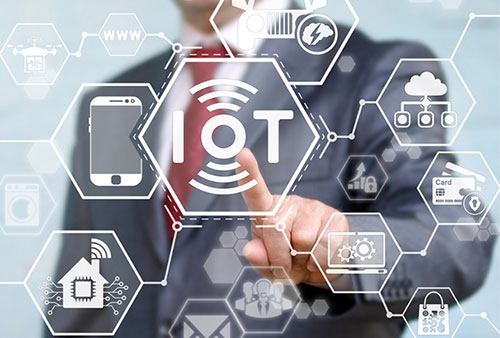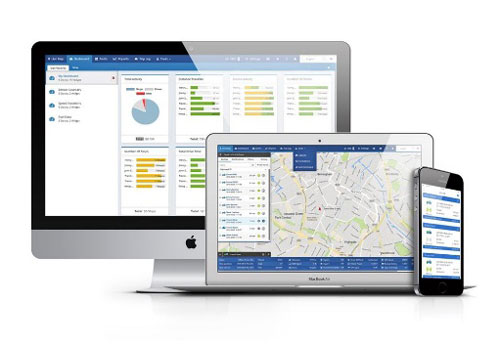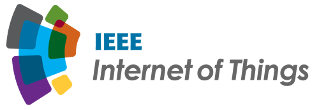How IoT Technology Transforms Fleet Operations
The first commercial transistor radio went on sale in 1954 and it was considered a huge milestone in technology for its small size and portability. Decades later, we are at another milestone in technology; Internet of Things which has taken the world by storm with its connectivity and advanced capabilities making ordinary objects and machines “smart”.
IoT’s journey began with RFID chips helping to advance manufacturing process and then followed by the consumer IoT applications with homes started seeing a huge level of automation with air conditions, lights and coffee machines self-operating according to our needs and choices. Naturally, this level convenience brought along a wave of innovations where every tool or device can be connected with each other and controlled over the Internet remotely.
The business world immediately recognized the potential benefits of the IoT technology and how it could restructure their business operations. With superior connectivity and continuous data flow as well as the ability to control and monitor their assets over the Internet, fleet operators gained access to a cutting-edge tool that will help them run their operations seamlessly. Fleet management systems have been a groundbreaking development for the fleet industry from day one. With the advanced network of IoT and sophisticated cloud-based tracking software, field operators keep track of fleet productivity and gain valuable insight into the condition of their vehicles and goods.

Figure 1: Internet of Things (IoT).
Other industries have a lot to learn from the fleet industry in leveraging the benefits of IoT. Owners of fleet businesses have to allocate a vast amount of resources, time and money effectively to meet the customer demand and operate at the optimum performance levels. IoT systems help businesses to manage their resources more efficiently to increase overall productivity and lower operational costs with improved visibility and access to vital information on-demand.
Telematics devices are the main source for gathering information on a fleet of vehicles. GPRS and GSM technologies used to be the preferred methods of communication for vehicle tracking devices and similar tracking systems for transmitting vast amounts of GPS, vehicle and driver data. However, these communication methods caused delays and problems as they were not a reliable way to convey data but IoT technologies reshaped the way how fleet businesses transfer and store information. With the advancement of the Internet technology itself and the rapid progress of IoT devices, telematics systems can easily obtain and analyze a plethora of information with the help of onboard telematics devices and cloud-based tracking software.
There are many aspects to a fleet operation and to thrive in a market as competitive as the fleet industry, field operators need accurate, real-time data to maximize the efficiency of their vehicles and drivers. By connecting a vehicle fleet over the cloud, managers can utilize a number of tools such as reports, trip log, driver behavior analysis, geofence zones, sensors and event alerts. These intelligent tools help the daily struggles of a fleet business from reducing the maintenance costs to keeping comprehensive mileage logs for the mileage tax deduction. Let’s take a look at some of these features and how IoT helps enhance the capabilities of the telematics systems.

Figure 2: Mileage Tax Deduction for Fleet Businesses.
Companies with a vehicle fleet have a lot of expenses to cover and few ways to lower their costs. However, there is a reliable way for a fleet company to reduce their yearly tax payments; mileage tax deduction and all the HMRC requires from companies are accurate mileage records as a proof for their business trips. The HMRC compensates companies for a portion of their operating expenses such as fuel, depreciation, maintenance costs, insurance payments, and registration fees. The gimmick for benefiting from this service to the full extent is to present HMRC with proper mileage logs of every single business trip taken by the company vehicles. It is an extremely challenging task to gather the data for each journey and determine whether it is a business trip or a personal one but with the help IoT technology and trip log, business managers can easily distinguish between business and personal trips. Telematics devices send the necessary data to the tracking platform to keep individual logs of every delivery, dropoff or a client meeting down to the last detail such as total mileage, the date of the trip, purpose of the business trip and destination. IoT devices and the trip log prove to be a perfect combination to provide HMRC with immaculate mileage records and take advantage of the tax reimbursements.

Figure 3: Fleet Management Software 2019.
Cargo security is a major issue for all businesses with a vehicle fleet that manufacture and transport goods. Thieves have always been a problem for fleet companies but it is an even bigger issue for manufacturing companies since they are a priority target for the adept criminals. While field managers are wary of the constant threat of theft, experienced thieves always look for opportunities for a quick buck which makes their work harder. A truck full of merchandise is an alluring prospect for criminals and if the vehicle doesn’t have proper security measures in place, it may as well have a bullseye painted on its back. Over the last years, IoT technology and fleet management systems have significantly improved the security aspect of fleet operations. Combined with the support of GPS location technology and sensors on board, IoT-enabled devices offer a set of features to ensure the safety of the cargo onboard the vehicle. From motion sensor to tampering alarm to geofence alerts, fleet managers gain access to a range of powerful security measures. The ability to monitor the location of a company vehicle as well as having multiple active event alerts will make sure no thief will be able to lay a hand on a single piece of cargo without triggering multiple alerts.
Running any business is a tedious task and it requires a lot of work hours but running a fleet business is an even more challenging task with more complex systems. The reporting capabilities of telematics systems provide business managers with a wide range of prominent tools to streamline their operations. Fully customizable reports allow managers to analyze routes, driver behavior, mileage, and fuel usage and provide valuable insight for fleet managers to make necessary changes throughout the fleet. From speed violations to causes of excess fuel consumption, business owners and operators can use these reports for guidance that can impact the decision-making process. This task requires a large amount of information and often in real-time to be accurate and effective and the whole process heavily relies on IoT technology. Telematics devices capture relevant data and quickly report to the cloud-based tracking server using the connectivity of the IoT technology. With 24/7 access to the essential fleet data, it's easy to keep track of assets and generate comprehensive diagnostic reports.
IoT and telematics technologies are becoming prevalent among fleet businesses for all the right reasons. Companies with a vehicle fleet are always on the lookout for ways to increase productivity, reduce operating costs and become more profitable. IoT technology presents fleet businesses with an array of tools to enhance overall operations. IoT plays a critical role in keeping the costs down and improving the connectivity of a vehicle fleet, that is why it is vital for companies to keep up with the times and take advantage of the sophisticated IoT systems.
Image Credits: Shutterstock
References
- https://en.wikipedia.org/wiki/Global_Positioning_System
- https://www.rewiresecurity.co.uk/blog/future-of-gps-and-global-positioning-locating
- https://www.telegraph.co.uk/business/business-reporter/telematics-fleet-management/
- https://www.geospatialworld.net/blogs/iot-applications-for-businesses/https://www.geospatialworld.net/blogs/iot-applications-for-businesses/
- https://www.rfidjournal.com/articles/view?18021/
- https://iotbusinessnews.com/2018/12/28/48744-how-to-tackle-logistics-and-cargo-security-issues-with-iot-and-telematics-systems/
- https://www.edn.com/electronics-blogs/edn-moments/4400387/First-commercial-transistor-radio-goes-on-sale--November-1--1954-
 Ekim Saribardak is a highly motivated IT professional who possesses a never-ending love and passion for web application and software projects. He is experienced with technical knowledge in all areas of telecommunications, GPS technology, web applications, digital marketing and product management, with an aptitude for problem-solving and decision-making with the ability to influence others in complex and pressurized circumstances. He has been a technology geek since 1990, starting from the moment he first had his hands on a computer. Since then, he has been researching and studying anything related to computers, fascinated with the way computers are changing everyday life. He has worked in both hardware and software fields for different businesses for over two decades.
Ekim Saribardak is a highly motivated IT professional who possesses a never-ending love and passion for web application and software projects. He is experienced with technical knowledge in all areas of telecommunications, GPS technology, web applications, digital marketing and product management, with an aptitude for problem-solving and decision-making with the ability to influence others in complex and pressurized circumstances. He has been a technology geek since 1990, starting from the moment he first had his hands on a computer. Since then, he has been researching and studying anything related to computers, fascinated with the way computers are changing everyday life. He has worked in both hardware and software fields for different businesses for over two decades.
Sign Up for IoT Technical Community Updates
Calendar of Events
IEEE 8th World Forum on Internet of Things (WF-IoT) 2022
26 October-11 November 2022
Call for Papers
IEEE Internet of Things Journal
Special issue on Towards Intelligence for Space-Air-Ground Integrated Internet of Things
Submission Deadline: 1 November 2022
Special issue on Smart Blockchain for IoT Trust, Security and Privacy
Submission Deadline: 15 November 2022
Past Issues
September 2022
July 2022
March 2022
January 2022
November 2021
September 2021
July 2021
May 2021
March 2021
January 2021
November 2020
July 2020
May 2020
March 2020
January 2020
November 2019
September 2019
July 2019
May 2019
March 2019
January 2019
November 2018
September 2018
July 2018
May 2018
March 2018
January 2018
November 2017
September 2017
July 2017
May 2017
March 2017
January 2017
November 2016
September 2016
July 2016
May 2016
March 2016
January 2016
November 2015
September 2015
July 2015
May 2015
March 2015
January 2015
November 2014
September 2014


